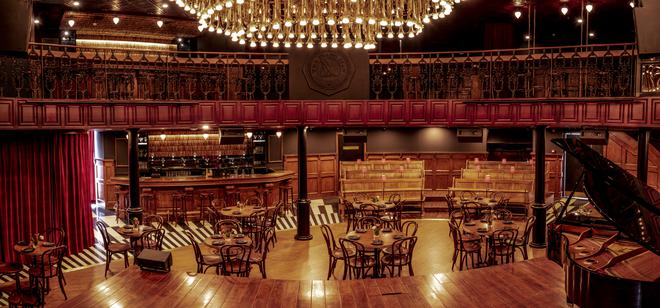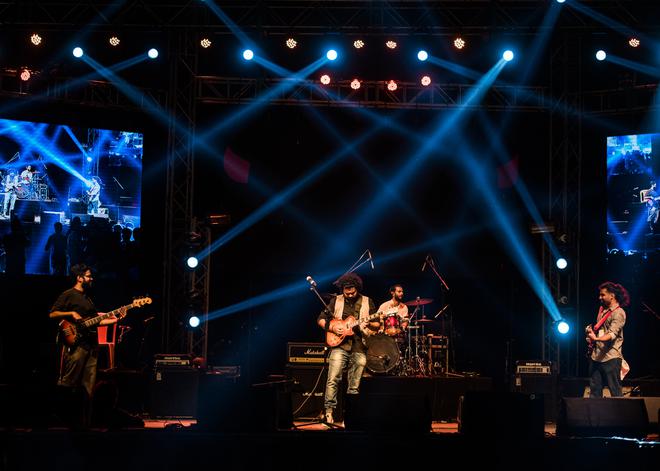As bands begin touring again, plunge into the newest wave of Indian jazz, with artists collaborating to create music that is progressive and open-minded, from home grown Carnatic jazz to an Afro beat-influenced version
As bands begin touring again, plunge into the newest wave of Indian jazz, with artists collaborating to create music that is progressive and open-minded, from home grown Carnatic jazz to an Afro beat-influenced version
Back in 2019, at the height of pre-pandemic freedom, unrestricted musical events, and generous budgets, The Many Roots Ensemble was an eight-piece jazz band. Besides the multi-city core of guitarist, bassist, drummer and saxophone player, “we had a three-piece song section, a keyboard player, a percussion guy and rappers,” recalls guitarist Subid Khan about their NH7 Weekender performance. Now, it is just the core four making music on their own.
It makes sense for a band like Many Roots to have a fluid crop of talent at its disposal: its signature sound blends jazz with a variety of North African and West African music, as well as Afro beats from Nigeria, along with elements of Indian folk and street music. The demand of each composition is different, so “when the occasion and budget allows, we get featuring acts,” says Subid over a call from Goa, where he is currently making music with Jarryd Rodrigues, Souvik Bhattacharya and Abhishek Debsidkar.
Jarryd Rodrigues, saxophone player with Many Roots Ensemble.
| Photo Credit: Special arranagement
Many Roots will be making its debut in South India with a performance at Chennai’s Black Orchid restobar this Friday, kicking off the Southside Groove Tour with Chennai-based jazz-rock band Jatayu.
The three-stop tour, put together by Shrikanth Natarajan of The Chennai Scene, will be taking the two bands to Catamaran Brewing Co in Puducherry and Fandom at Gilly’s Redefined in Bengaluru as well, in the hope of exposing music lovers to newer, more playful versions of homegrown Indian jazz. As comparatively younger musical acts, albeit with steady followings within the country’s indie circuit, they are not the only jazz artistes looking to build an audience in the country.
As Jatayu guitarist Sahib Singh explains, “Conceptually, both of us [Jatayu and Many Roots] are doing the same thing: we are both collaborative projects looking to work with different artistes. The music for both is progressive and open-minded, be it our Carnatic jazz or their Afro beat-influenced jazz. We have been meaning to play with Many Roots, who have never played down South, so we thought we would show them around.”
This will be Jatayu’s second tour in recent months, after its Restless Tour with Harini Iyer in Delhi, Gurugram and Hyderabad. Collaboration is inherent to jazz; the genre demands to be played around with. So, obediently enough, after Harini, Jatayu is currently working with a number of Indian and international artistes including Chennai-based jazz vocalist Susha to release a string of singles.
Bands like Jatayu, Till Apes, The Revisit Project, The Many Roots Ensemble are part of the latest crop of Indian Jazz musicians — the newest wave in a tide that has been steadily turning for over two decades now. For Tanish Thakker, who co-runs the platform Jazz in India founded by Emmanuel De Decker, making note of upcoming talent, platforms and festivals is an everyday task. He explains, “They are what we call the new jazz cats. There are so many different genres and different styles of Jazz today. First you have the calibre of Gino Banks, Rhythm Shaw, Vasundara Vee, Mohini Dey, Ravi Chari and Rakesh Chaurasia and many more in that space.”
This top tier is not something Tanish defines by age or era, but by pure calibre. It includes Louis Banks who has been making music since the 1990s and is still active today, and Rhythm Shaw who is yet to hit the age of 30, both of whom in their own separate ways have been creating magic, and taking Indian jazz abroad on global tours. And then there have been musicians like the late Madhav Chari, popular on the global stage for his dedication to pure jazz, without new-age influences.
“Then,” adds Tanish, “You have talented people like Anubha Kaul, Shirish Malhotra, Aman Jagwani, Shreyas Iyengar, Anurag Naidu, Shreya Bhattacharaya, Avishek Dey in Mumbai / Pune and The Bodhisattva Trio guys from Kolkata. Then there are the new guys coming up with the neo-soul, rnb & soul styles, like Ranjani Ramadoss, Jatayu, Fakeer & The Arc, Second Sight and the list goes on …”
Why jazz clubs matter
“Back when I used to play in hotel lobbies or clubs, the focus was not on music; we were in the background, an accessory. The staff would treat us disrespectfully; and there was a special ‘artists menu’ (which there continues to be in most establishments),” says Arjun, explaining his motivation behind creating a separate space for jazz.
This approach makes a difference on two levels.
Firstly, attitude changes show the musicians respect. At The Piano Man, performing artistes can eat and drink on the house, have access to a green room to rest in, and are treated as a priority by the staff, since in Arjun’s words: “The customers are there because the artistes are there.”
The second difference is on an architectural and design level: “We made it a point to expand vertically rather than horizontally [with an upper deck and mezannine floors for seating] to have more people looking at the artists with a reduced line of sight and distance from the stage. If the environment is designed for the listening experience, you build a better experience and a loyal patronage. We also have state of the art sound systems, and a piano, drums and other instruments in-house.”
In-house support systems
The roster of talent spans towns, cities and states across the country, aided and abetted by a host of jazz clubs. Most of these new clubs are less than a decade old, but have been steady in both their search and their programming of fresh talent. While The Piano Man Jazz Club has been organising indie performances in Delhi since 2015 and Gurugram since 2019, Shisha Jazz Cafe in Pune has been regular with its jazz night since 2003.
On the other hand, Skinny Mo’s Jazz Club opened in an old Art Deco building in Kolkata as recently as in 2019. Encouraging music that blends Indian ethos with the playfulness of jazz, these clubs have been consciously trying to keep alive the country’s relationship with jazz, a tryst that began as early as the 1930s, the era when the African American violinist Leon Abbey brought a jazz band to India, and Bombay’s Taj Mahal Palace Hotel famously opened its stage to jazz that was, for the first time, non-white.

The Piano Man Jazz Club opened a second branch in Gurugram in 2019
| Photo Credit: SPECIAL ARRANGEMENT
That era was a far cry from today, when The Piano Man Jazz Club founder Arjun Sagar Gupta has a dedicated curation team “who are now documenting city-wise artists, two cities per week, and reaching out to them for verification and bios so that we can improve our database.” Arjun, a jazz musician in his own right, also maintains a network with embassies and international touring managers, and is hopeful of having 30 international artistes visiting in the second half of the year.
And yet, despite performances by the likes of 23-Grammy-winner Chick Corea, a bulk of Arjun’s programming remains focused on local talent: “From five shows a week on Day one and seven shows a week by our third month, we went to two shows a day — lunch and dinner — post the first wave. Currently, we host 28 shows a week between the two clubs.”
Clearly, there is enough talent and more. Says Arjun, “About 12 years ago, I could count the number of talented Indian jazz artistes on the fingertips of two hands. Now, we have a couple of dozen people per city who are really good. We also have the cream of the crop coming up, who can hold their own on the international circuit.”
For details about the Southside Groove Tour, visit www.skillboxes.com or @thechennaiscene on Instagram.

























